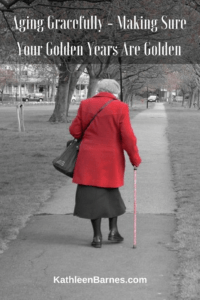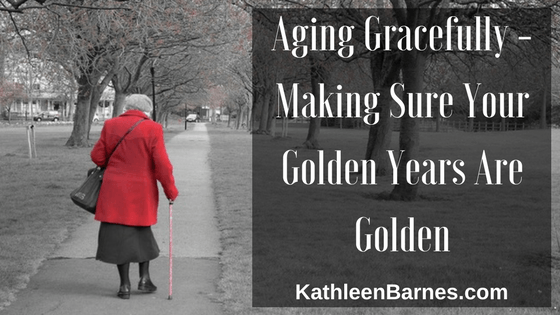Note: This article by Kathleen was published in Natural Awakenings magazine (www.naturalawakeningsmagazine.com). Enjoy while she is enjoying herself in Ireland.
 Most of us would like to imagine ourselves as vibrant, energetic, smart and, yes, gorgeous, all the way to the end of our lives. This isn’t a fantasy or beyond our reach.
Most of us would like to imagine ourselves as vibrant, energetic, smart and, yes, gorgeous, all the way to the end of our lives. This isn’t a fantasy or beyond our reach.
Sadly, poor lifestyle choices have tarnished the Golden Years for many of us unnecessarily.
The good news is that it is never too late (or too early) to make those small changes that profoundly influence our ability to live long and healthy lives.
In fact, experts offer a handful of simple health strategies that are scientifically validated to help us age gracefully and beautifully.
“Most of us are living longer, but not necessarily living better,” says Silicon Valley-based anti-aging doctor Arlene Noodleman, M.D. “So many people face decades of chronic debilitating disease. We can minimize or even eliminate that period of life and maximize health. It’s all about lifestyle.”
Whether the goal is disease prevention, retaining a sharp mind, weight control, hormone balancing, maintaining good posture and glowing skin, all of our experts agree that this core strategy will work to extend life across the board and improve quality of life in later years:
Take a walk: Or get any type of regular exercise that you enjoy, preferably outdoors for about 30 minutes a day.
Greet the sun: Exposing bare skin to sunlight just 15 minutes three times a week allows natural production of vitamin D, which has a huge body of scientific validation for its abilities to prevent cancer, heart disease, diabetes, depression, obesity, osteoporosis and osteoarthritis, relieve menopausal symptoms and overall lengthen your life and won’t get you sunburned or age your skin.
Drink plenty of water: Overall hydration is key to cell health and proper function. Think of a plant that is not watered, how it becomes dry and brittle. Aim for one ounce of water every day for every two pounds of body weight, or 75 ounces for a 150-pound person.
Eat a healthy diet: This means loads of vegetables, fish, lean meats and poultry and moderate amounts of fruits and grains for weight control, abundant antioxidants to prevent the deterioration that causes chronic disease and vital nutrients that extend life. Avoid sugars in all forms, simple carbohydrates, processed foods and, for many, wheat and wheat gluten, especially for those with abdominal fat.
Get a good night’s sleep: Eight hours is more than beauty sleep. Science tells us it’s essential for energy and for the prevention of a host of diseases, including obesity, diabetes, heart disease and cancer. Regular sleeping and waking times are important as is sleeping in a very dark room to optimize melatonin production. And, no, experts say, it is not true that we need less sleep as we age.
Take the right supplements: Take a good quality multivitamin every day, preferably an organic product based on whole foods for optimum nutrition; fish oil is essential for nearly everyone for heart, brain and joint health, vitamin D for all the reasons listed above, especially in the winter moths and for dark-skinned people who need longer sun exposure to manufacture vitamin D and curcumin, for the many studies that show it can prevent and even reverse cancer, Alzheimer’s, osteoarthritis, skin diseases and digestive disorders.
As the Baby Boomer generation enters its senior years, many of us have borne painful witness to the decline and demise of our parents and grandparents.
Many of us joke that “65 is the new 35” and there is a great deal of truth to that. Yet the shadow of memory loss and dread disease still haunt us.
Preventing Alzheimer’s disease and dementia
Since many of us have been caregivers for parents with Alzheimer’s and dementia, we have big concerns about repeating that pattern.
“Yes, there is some evidence that a tendency to memory loss can be inherited, but in any case, there are things you can do to prevent and even possibly reverse memory loss,” according to Arlene Noodleman, M.D., a Silicon Valley-based anti aging specialist.
Stress reduction is the #1 strategy to keep a sharp mind, says Dr. Noodleman. “Chronic stress inhibits the cerebral cortex (the brain’s gray matter, responsible for higher mind function, including memory), resulting in a lack of judgment and other impaired brain function. Manage stress and memory function will improve.”
“Use it or lose it,” advises Jacob Teitelbaum, M.D., the Hawaii-based author of Real Cause, Real Cure.
Extensive research shows that challenging the brain with puzzles, language courses, having an active social life and getting regular exercise are all related to lifelong brain health.
“As many people age, their world gets narrower, sometimes because of physical limitations and mental limitations, so there tends to be less stimulation. People who age gracefully are physically and mentally active. It’s multifactorial,” Dr. Noodleman explains.
Getting upside down improves circulation to the brain and may help keep brain cells intact. Yoga postures like the shoulder stand or headstand, used by yogis for centuries or inversion tables can do the trick in just a few minutes a day.
Deep breathing and increased oxygenation of the blood helps relieve stress and get nutrients to brain cells.
It’s important to keep brain cells healthy and alive by keeping blood sugars and blood pressure under control, adds Lisa Ganghu, D.O., and internal medicine specialist and clinical assistant professor at New York University’s Langone Medical Center.
High blood pressure and diabetes are risk factors for strokes and mini-strokes that result in brain cell impairment, says Dr. Ganghu.
“There has also been research that suggests that caffeine may improve memory and focus,” she adds.
Preventing heart disease, cancer and diabetes
While proper diet is an important element of preventing the diseases commonly associated with aging, it’s not the only way to take control.
Dr. Ganghu is a fan of largely plant-based diets, like the Mediterranean diet, to keep the common disease of aging at bay.
Contrary to what conventional medicine recommends, Dr. Teitelbaum says not to worry about salt intake for most people with high blood pressure and heart disease.
“Research shows that people who follow the national guidelines for salt intake tend to die younger. Instead, it’s important to keep magnesium and potassium levels where they should be by adding 200 mg of magnesium and 500 mg of potassium to your supplement regiment every day.”
To prevent and control diabetes, “Avoid sugar, avoid sugar, avoid sugar,” Dr. Teitelbaum repeats. “It causes premature cell aging that effects all body systems.”
Cancer cells typically wildly reproduce and do not die as all cells in the human body are programmed to do.
Recent research from Baylor University strongly suggests that curcumin taken as a dietary supplement (400 mg a day or more) can persuade cancer cells to commit suicide and stop the wildly and potentially fatal reproduction.
Dr. Ganghu also recommends limiting toxin exposure from environmental hazards like common garden and household chemicals and food contaminants.
Weight control
Obesity has been linked to increased risk for all of the dreaded disease of aging.
A large body of research shows that keeping weight under control is paramount for longevity as well as disease prevention. The Centers for Disease Control and Prevention reports that people with a Body Mass Index (BMI) over 35 are at an 18% higher risk of death from all causes than those of normal body weight (BMI of 25 or under).
Hormones can be a factor for perimenopausal and menopausal women, says Dr. Ganghu, so it is important to be tested. She also notes that loss of muscle mass with aging can affect weight control since muscle tissue is metabolically more active than fat tissue, creating a vicious circle. Her recommendation: strength training to improve muscle strength and mass.
Typically, two 20-minute sessions a week with moderate weights are enough to create Michelle Obama arms, says Kathy Smith, Park City, Utah-based fitness DVD star and spokesperson for the International Council on Aging.
Good Posture
Those who spend a significant amount of time in front of a computer are well familiar with the computer slouch.
“As we age, we get tight in the chest,” says Smith. “We spend a lot of time driving, working on computers and other activities with our arms in front of us. This causes chest muscles to contract and become tight, drawing the head forward and rounding the spine.”
Compensating with backward bending stretches can go a log way toward correcting the muscles and core weakness that accompany the head forward position and can result in “dowager’s hump.” Something as simple as lying flat on the floor with arms extended to the sides as high as comfortable will help balance the forward slouch. Yoga postures like the cobra and the bow are also helpful.
Strength training is important for strengthening shoulder and back muscles responsible for helping us stay upright, compensating for weakened chest muscles that result from the computer slouch.
Smith highly recommends a “walking desk,” essentially a treadmill with a board across the arms where a laptop can rest and the user walks at a very slow pace–1-2 miles per hour.
“You’re moving, not sitting and that is really important, says Smith.
Healthy Skin
“Your skin is a roadmap of your overall health,” says dermatologist Rick Noodleman, M.D., who practices anti-aging medicine in Silicon Valley with his wife.
It’s not vain to want smooth, healthy, glowing skin, explains the dermatologist who recommends short spurts of unprotected sun exposure (a few minutes a day is sufficient for most of us) for healthy levels of vitamin D and natural sunscreens the rest of the time.
Dr. Noodleman says skin aging is caused by the 3 D’s: deflation, descent and deterioration. Only descent, the ravages of gravity over decades, cannot be reversed.
Deflation is loss of volume and moisture, which can be helped by proper internal hydration and good moisturizers.
“People can make new collagen well into their 80s and even 90s,” he explains.
Deterioration is the loss of skin tone and elasticity that can accompany stress, poor diet and lack of exercise. He points out the toll stress has taken on President Obama’s skin in recent photos of his first inauguration and his second.
Dr. Noodleman recommends regular exfoliation of skin on the face (an economical at-home facial with baking and water or eggs is high on his list) and he’s a big fan of dry brushing the whole body.
New laser treatments, acupressure facelifts and other spa treatments can also minimize wrinkles and bring back a youthful glow temporarily, he adds.
Aging beautifully
It’s not hard to be vibrant, healthy and energetic at any age if you’re living a healthy lifestyle.
“I feel like I am 30. I expect to feel that way for the rest of my life,” says the 60-something Dr. Teitelbaum.
“Of course, I’m not going to the beach in a Speedo,” he quips. “Who wants to look 20? There is also beauty in age.”








I concur with all of the above, except yoga head and hand stands at my age of 80!